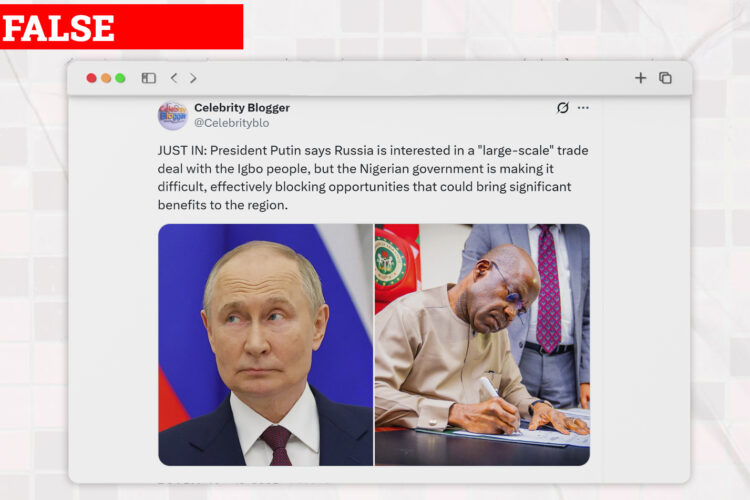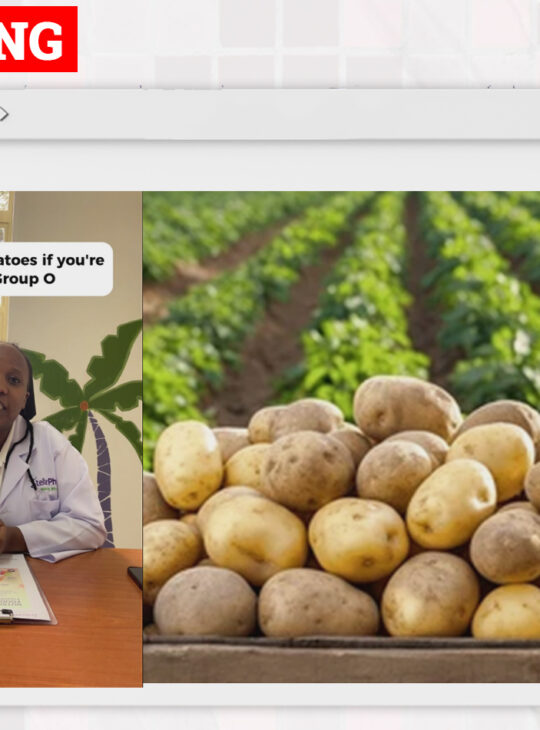Has The Nigerian Government Blocked Trade Deals Between Russia And The Igbos?
On May 19, 2025, an X user claimed that the Nigerian government has continuously blocked trade deals between the Russian government and the Igbos. This was posted with a collage image of Russian president, Vladimir Putin and the governor of Abia state, Alex Otti, and captioned “JUST IN: President Putin says Russia is interested in a “large-scale” trade deal with the Igbo people, but the Nigerian government is making it difficult, effectively blocking opportunities that could bring significant benefits to the region.”
One of the two comments on the post reads, “Na why you no fit blow Posting false information.” This post had about 1,260 views and approximately 12 replies, reposts, quotes,and likes, as of when this report was published.
VERIFICATION
The Russian President has mentioned strengthening Russia’s ties with Africa and Nigeria, indicating interest in energy, agriculture, infrastructure, and food security. He has previously described deepening the ties between Russia and the continent as a key goal for Russia and at the 2023 Russia-Africa Summit promised grain, nuclear-energy cooperation, and general trade preferences. However, none of Putin’s publicly available remarks singled out the Igbo ethnic group as a distinct trading counterparty. Rather, the focus is on Nigeria as a whole or pan-African engagement.
During the Russia-Africa Economic and Humanitarian Forum held at the Russia-Africa Summit in July 2023, President Vladimir Putin of Russia pledged closer ties with Nigeria and other African nations. Vice President Kashim Shettima, who attended the summit said Nigeria would partner with Russia to revive the Aluminium Smelter Company of Nigeria, particularly by engaging with key stakeholders in the industry. No documented report about Russia and Africa references any deal specifically targeting Igbo territories or communities.
Recently, at the St. Petersburg International Economic Forum, Sberbank and Niger state signed a Memorandum of Intentions. According to the Embassy of Russia in Nigeria, the memorandum is in the field of application of artificial intelligence technologies and implementation of projects for digital transformation of the region’s economy sectors.
However, Nigerian‑Russia partnerships have faced mutual delays and unfulfilled promises (e.g., nuclear plants, trade preferences, direct flights) but no sources indicate deliberate suppression of an Igbo-centric initiative. Challenges cited are general bureaucratic, infrastructural, or geopolitical, not region-specific obstruction of Russia-Igbo trade.
CONCLUSION
The claim that the Nigerian government has continuously blocked trade deals between the Russian government and the Igbos is FALSE as there is no credible evidence that President Putin has specifically declared an interest in a “large‑scale trade deal with the Igbo people,” nor that the Nigerian government is intentionally blocking such a deal for the benefit of that region.



